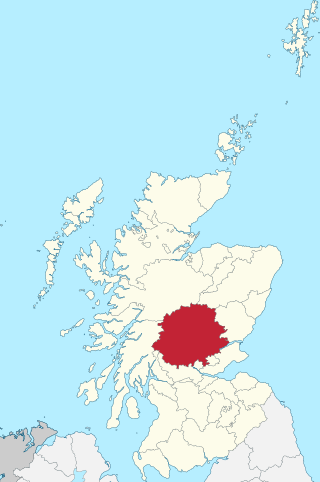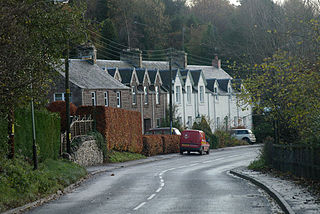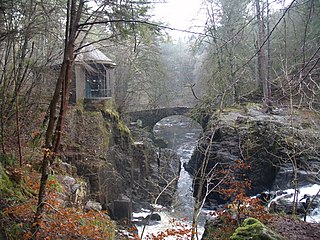
Perthshire, officially the County of Perth, is a historic county and registration county in central Scotland. Geographically it extends from Strathmore in the east, to the Pass of Drumochter in the north, Rannoch Moor and Ben Lui in the west, and Aberfoyle in the south; it borders the counties of Inverness-shire and Aberdeenshire to the north, Angus to the east, Fife, Kinross-shire, Clackmannanshire, Stirlingshire and Dunbartonshire to the south and Argyllshire to the west. It was a local government county from 1890 to 1930.

Perth is a city in central Scotland, on the banks of the River Tay. It is the administrative centre of Perth and Kinross council area and is the historic county town of Perthshire. It had a population of about 47,430 in 2018.

Atholl or Athole is a large historical division in the Scottish Highlands, bordering Marr, Badenoch, Lochaber, Breadalbane, Strathearn, Perth, and Gowrie. Historically it was a Pictish kingdom, becoming one of the original provinces of the Kingdom of Alba before being incorporated into the sheriffdom and later county of Perthshire. Today it forms the northern part of Perth and Kinross, Scotland.

Dunkeld Cathedral is a Church of Scotland place of worship which stands on the north bank of the River Tay in Dunkeld, Perth and Kinross, Scotland. Built in square-stone style of predominantly grey sandstone, the cathedral proper began in 1260 and completed in 1501. It stands on the site of the former Culdee Monastery of Dunkeld, stones from which can be seen as an irregular reddish streak in the eastern gable.

Dunkeld is a town in Perth and Kinross, Scotland. The location of a historic cathedral, it lies on the north bank of the River Tay, opposite Birnam. Dunkeld lies close to the geological Highland Boundary Fault, and is frequently described as the "Gateway to the Highlands" due to its position on the main road and rail lines north. Dunkeld has a railway station, Dunkeld & Birnam, on the Highland Main Line, and is about 25 kilometres north of Perth on what is now the A9 road. The main road formerly ran through the town, however following modernisation of this road it now passes to the west of Dunkeld.

Logierait is a village and parish in Atholl, Scotland. It is situated at the confluence of the rivers Tay and Tummel, 500 metres west of the A9 road in Perth and Kinross.

Bankfoot is a village in Perth and Kinross, Scotland, approximately 8 miles (13 km) north of Perth and 7 miles (11 km) south of Dunkeld. Bankfoot had a population of 1,136 in 2001. In the 2011 Census the population of Bankfoot was 1,110 people with there being a slightly higher number of male residents (51.4%) than female residents (48.6%). It was found that 33% of Bankfoot residents were aged 60 or older.

Murthly is a village in Perth and Kinross, Scotland. It lies on the south bank of the River Tay, 5 miles southeast of Dunkeld, and 9+1⁄2 miles north of Perth. Perth District Asylum, later known as Murthly Hospital, was opened in the village on 1 April 1864 for 'pauper lunatics'. It was the second district asylum to be built in Scotland under the terms of the Lunacy (Scotland) Act 1857. It closed in 1984 and was later demolished. The village has a stone circle, in the former grounds of the hospital. The village formerly had a railway station on the Perth and Dunkeld Railway, which closed in 1965.

The Hermitage Bridge is an ancient, single-arch stone pedestrian bridge crossing the River Braan near Dunkeld, Perth and Kinross, Scotland. A Category A listed structure, it is in the bounds of The Hermitage, a National Trust for Scotland-protected site. The bridge should not be confused with the Rumbling Bridge, which carries motorised traffic, about 0.62 miles (1.00 km) to the southwest.

The Taybank Hotel is a hotel and restaurant in Dunkeld, Perth and Kinross, Scotland. It is a Category C listed building dating to the early 19th century.

The Perth Arms Hotel is a hotel and restaurant in Dunkeld, Perth and Kinross, Scotland. It is a Category B listed building dating to around 1755.

Dunkeld market cross, in the Scottish town of Dunkeld, Perth and Kinross, is in the form of a drinking fountain. A Category B listed structure in the care of the National Trust for Scotland, it was designed by Charles Sandeman Robertson and erected in 1866 as a monument to the George Murray, 6th Duke of Atholl. It replaced a cross that was about 20 feet (6.1 m) high, with four iron jougs attached to it.

The Atholl Arms Hotel is a hotel and restaurant in Dunkeld, Perth and Kinross, Scotland. Standing at the corner of Bridge Street and Boat Road, it is a Category B listed building dating to 1833.

The Atholl Arms Hotel is a hotel and restaurant in Blair Atholl, Perth and Kinross, Scotland. Standing on the B8079, it is a Category C listed building dating to 1832.

The Ell House is an historic building in Dunkeld, Perth and Kinross, Scotland. Standing at the corner of High Street and Cathedral Street, near Dunkeld Market Cross, it is a Category B listed building dating to 1757. It was, along with 1 Cathedral Street at its rear, formerly St George's Hospital. The building is so named because it has a weaver's measure attached to its exterior.
1 Cathedral Street is an historic building in Dunkeld, Perth and Kinross, Scotland. Standing on Cathedral Street, it is a Category B listed building dating to c. 1757. It is two storeys, with a three-window frontage.
















